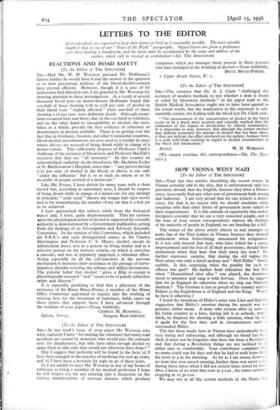LETTERS TO THE EDITOR
[Correspondents are requested to keep their letters as brief as is reasonably possible. The most suitable length is that of one of our " News of the Week" paragraphs. Signed letters are given a preference over those bearing a pseudonym, and the latter must be accompanied by the name and address of the author, which will be treated as confidential.—Ed. THE SPECTATOR]
REACTIONS AND ROAD SAFETY
[To the Editor of THE SPECTATOR] Snt,—Had Mr. W. H. Worsnop pursued Dr. Hoffmann's figures further he would have found the answer to the question as to how percentage analyses of the blood-alcohol-content have proved efficient. However, though it is a case of by indirection find direction out, I am grateful to Mr. Worsnop for drawing attention to these investigations. As a result of several thousand blood tests on motor-drivers Hoffmann found that one-half of those showing o.o6 to 0.08 per cent. of alcohol in their blood were " slightly affected," while one-half of those showing 0.22 per cent. were definitely drunk. Although excep- tions occurred here and there, due on the one hand to tolerance, and on the other hand to susceptibility to alcohol, the tests, taken as a whole, provide the best evidence of soberness or drunkenness at present available. There is no getting over the fact that in Germany, Sweden, and other Continental countries, blood-alcohol determinations are now used as a routine in cases where drivers are accused of being drunk while in charge of a motor-vehicle. This sufficiently disposes of Professor Clark's challenge of the accuracy of blood-tests and Professor MacFall's assertion that they are " all nonsense." In this country an acknowledged authority on the blood-test, Mr. McAdam Eccles of St. Bartholomew's Hospital, states that : " any person having 0.15 per cent. of alcohol in the blood, or above, is not only ' under the influence ' but is so to such an extent as to be incapable of proper control of a motor-car."
' Like Mr. Foster, I have driven for many years with a clean record but, according to customary tests, I should be suspect of being drunk while in charge of a motor-car, for any attempt to articulate " truly rural " throws my tongue into rigor mortis and as for remembering the number of my car that is a feat yet to be achieved.
I have approached this subject solely from the biological aspect and, I trust, quite dispassionately. That my opinion upon the physiological action of alcohol is supported by scientific authority is demonstrated by a Government publication setting forth the findings of an Investigation and Advisory Scientific Committee. In the opinion of this Committee, which included six F.R.S.'s and such distinguished names as Sir Charles Sherrington and Professor C. S. Myers, alcohol, except in infinitesimal doses, acts as a poison on living matter and as a selective poison on the nervous system, on which it exercises a narcotic, and not, as popularly supposed, a stimulant effect. Acting especially on all the cell-junctions in the nervous mechanism it increases their resistance to the passage of nerve- impulses, thereby retarding the reflexes and skilled movements. The popular belief that alcohol " gives a fillip to energy is physiologically unsound " and " seems to be of purely subjective origin and illusory."
It is especially gratifying to find that a physician of the eminence of Sir Bruce Bruce-Porter, a member of the Home Office Committee appointed to inquire into the working of existing Acts for the treatment of inebriates, holds views on these points that support those I have advanced through the medium of your paper.—Yours faithfully,
CHARLES M. BEADNELL,






































 Previous page
Previous page